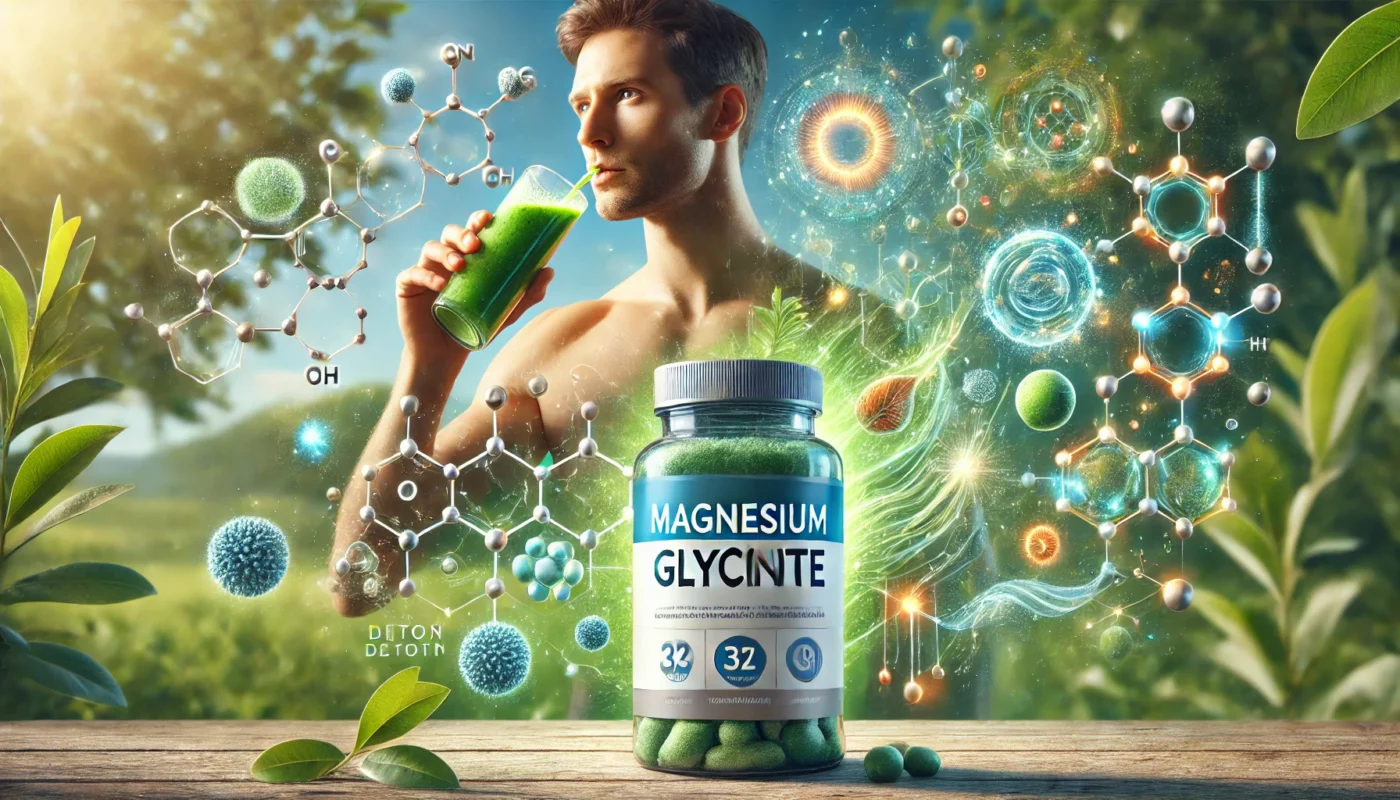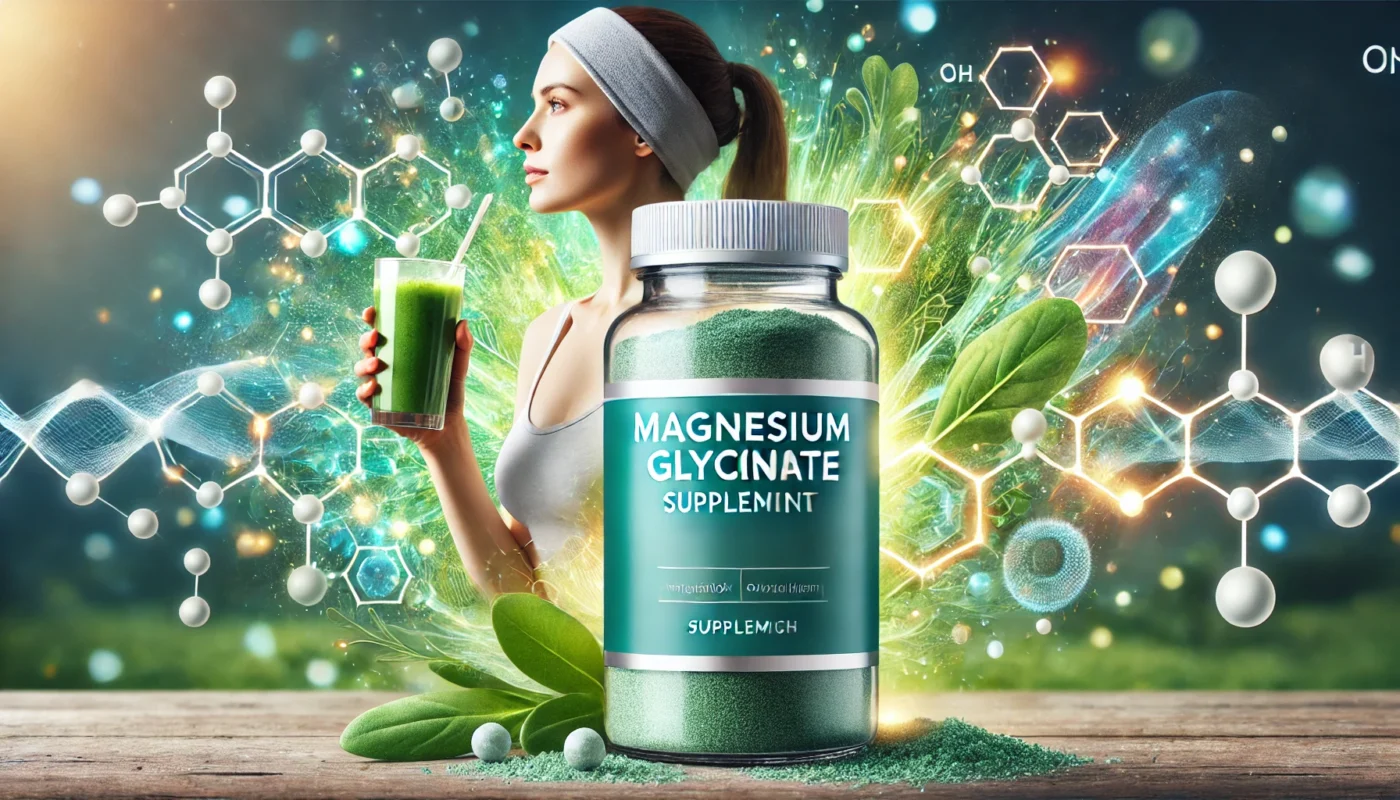Detox diets are designed to rid the body of toxins and support optimal organ function, particularly in the liver, kidneys, and gastrointestinal system. However, the success of any detox effort depends on the availability of essential nutrients that facilitate the body’s natural detoxification pathways. One nutrient increasingly recognized for its crucial role in these processes is magnesium, specifically in the form of magnesium glycinate. Renowned for its high bioavailability and gentle effect on digestion, magnesium glycinate is uniquely positioned to enhance the body’s ability to eliminate toxins effectively. This article explores the science behind magnesium glycinate’s role in detox diets, supported by research and clinical studies.
You May Also Like:
Magnesium Glycinate for Healthy Skin: Can It Support Wound Recovery?
Magnesium Glycinate for Migraines: How It Differs from Other Treatments
How Magnesium Glycinate Supports Detox Diets is an original (HSLHealing) article.
Understanding Magnesium’s Role in Detoxification
Magnesium is a cofactor in over 300 enzymatic reactions in the body, many of which are directly or indirectly involved in detoxification. These include:
- Supporting Phase I and II Liver Detoxification:
- The liver neutralizes toxins through two phases of detoxification. Phase I involves oxidation, reduction, or hydrolysis reactions, often producing intermediate compounds that are more reactive and potentially harmful. Magnesium is a vital component of these enzymatic systems.
- In Phase II, these intermediates are conjugated with molecules like glutathione, sulfate, or glucuronide to make them water-soluble for excretion. Magnesium-dependent enzymes facilitate this process.
- Regulating Bile Production:
- Magnesium supports bile secretion, a critical pathway for the elimination of fat-soluble toxins.
- Facilitating Cellular Detoxification:
- Magnesium regulates ion transport across cell membranes, ensuring cells maintain optimal function while exporting toxins.
- Reducing Oxidative Stress:
- Many toxins generate free radicals, leading to oxidative stress. Magnesium plays a protective role by supporting antioxidant enzymes like glutathione peroxidase.

Why Magnesium Glycinate Is Ideal for Detox Diets
While magnesium is available in many forms, magnesium glycinate is often the preferred choice for detox diets due to its unique properties:
1. High Bioavailability
Magnesium glycinate is chelated, meaning the magnesium ion is bound to glycine, an amino acid. This chelation enhances the absorption of magnesium in the intestines and ensures better retention in the body. A study published in Magnesium Research (2012) demonstrated that magnesium glycinate had higher bioavailability than magnesium oxide or citrate, making it a superior option for replenishing magnesium levels during detox.
2. Gentle on Digestion
Detox diets often emphasize nutrient-rich, fiber-heavy foods that can occasionally lead to gastrointestinal discomfort. Magnesium glycinate is gentle on the stomach and less likely to cause diarrhea compared to magnesium sulfate or citrate, which can disrupt detox efforts.
3. Added Benefits of Glycine
Glycine itself plays a pivotal role in detoxification:
- It is a key substrate for glutathione synthesis, the body’s most potent antioxidant.
- Glycine conjugation in Phase II liver detoxification helps neutralize and excrete fat-soluble toxins.
By combining magnesium and glycine, magnesium glycinate offers dual-action support for detoxification processes.
Magnesium Glycinate in Detoxification Pathways
1. Liver Detoxification
Magnesium glycinate supports the liver’s detoxification pathways in several ways:
- Enzyme Activation: Magnesium activates enzymes involved in the cytochrome P450 system, which processes toxins in Phase I detoxification. Studies have shown that magnesium deficiencies can impair this system, leading to a buildup of toxic intermediates.
- Glutathione Production: The glycine component of magnesium glycinate is critical for synthesizing glutathione. According to a 2020 review in Nutrients, glutathione depletion is linked to reduced liver detoxification efficiency. Supplementing with glycine-rich compounds like magnesium glycinate can restore glutathione levels and enhance liver function.
2. Gastrointestinal Detoxification
The gastrointestinal tract is a primary route for toxin elimination. Magnesium glycinate supports this pathway by:
- Promoting Regular Bowel Movements: While other forms of magnesium can act as laxatives, magnesium glycinate’s effect is milder and more sustainable. Regular bowel movements are essential for eliminating toxins bound to bile acids.
- Supporting Gut Microbiota: Magnesium is known to influence gut microbiota composition, which plays a role in metabolizing dietary toxins and maintaining gut barrier integrity.
3. Kidney Function
The kidneys filter blood, removing water-soluble toxins for excretion through urine. Magnesium is crucial for maintaining renal function by:
- Regulating electrolyte balance.
- Preventing the formation of kidney stones, which can impede detoxification.
- Reducing inflammation, a common consequence of toxic overload.
A clinical trial published in Kidney International (2019) found that magnesium supplementation improved renal function and reduced markers of oxidative stress in individuals with compromised kidney health.

Research-Backed Benefits of Magnesium Glycinate for Detox Diets
1. Combating Oxidative Stress
Detox diets aim to minimize oxidative stress caused by toxin exposure. Magnesium glycinate bolsters the body’s antioxidant defenses by supporting enzymes like superoxide dismutase and glutathione peroxidase. A 2017 study in Free Radical Biology and Medicine showed that magnesium supplementation reduced oxidative damage markers in individuals exposed to environmental toxins.
2. Improving Sleep and Stress Levels
Detoxification processes are more efficient during sleep, when the body focuses on repair and restoration. Magnesium glycinate, with its glycine component, promotes relaxation and improves sleep quality. Research in The Journal of Clinical Sleep Medicine (2018) highlighted that individuals taking magnesium glycinate experienced fewer nighttime awakenings and improved overall sleep efficiency.
3. Enhancing Energy Metabolism
Detox diets often emphasize fasting or reduced calorie intake, which can lead to fatigue. Magnesium is a cofactor for ATP production, the primary energy currency of cells. A study in Nutrients (2020) found that magnesium glycinate supplementation improved energy levels and reduced fatigue in individuals following calorie-restricted diets.
4. Supporting Cardiovascular Health
Many toxins can damage cardiovascular health, leading to inflammation and hypertension. Magnesium glycinate helps regulate blood pressure and reduce inflammation, providing additional protective benefits during detoxification.
How to Incorporate Magnesium Glycinate into Detox Diets
Dosage Recommendations
The recommended daily intake of magnesium varies based on age, gender, and health status:
- Adult women: 310–320 mg/day
- Adult men: 400–420 mg/day
For therapeutic use in detox diets, doses of 200–400 mg of elemental magnesium (from magnesium glycinate) are common. Always consult a healthcare provider before beginning supplementation, especially if you have a medical condition or are taking other medications.
Timing and Administration
Magnesium glycinate is best taken with meals to improve absorption. For individuals using it to support sleep and relaxation, evening dosing may be more effective.
Complementary Nutrients
Magnesium glycinate works synergistically with other nutrients in detox diets, including:
- Glutathione: The body’s master antioxidant.
- Vitamin C: Enhances liver detoxification and reduces oxidative stress.
- B Vitamins: Essential cofactors for energy metabolism and detox enzymes.

Potential Side Effects and Precautions
Magnesium glycinate is generally well-tolerated, but excessive doses can cause mild side effects like nausea or diarrhea. Individuals with kidney disease or those taking medications such as diuretics or antibiotics should consult their healthcare provider to avoid interactions or imbalances.
Conclusion
Magnesium glycinate stands out as a powerful ally for detox diets, offering a combination of high bioavailability, digestive tolerance, and dual-action benefits from glycine. By supporting liver detoxification, gastrointestinal function, and kidney health, magnesium glycinate enhances the body’s natural ability to eliminate toxins efficiently. Furthermore, its role in reducing oxidative stress, improving sleep, and sustaining energy levels makes it a versatile tool for anyone seeking to optimize their detoxification efforts.
Backed by clinical research and practical applications, magnesium glycinate is an essential addition to any detox strategy. With its superior absorption and wide-ranging benefits, it’s clear why this form of magnesium has gained widespread recognition among health professionals and wellness enthusiasts alike.

References
- Barbagallo, M., & Dominguez, L. J. (2017). Magnesium in clinical practice: A review of evidence. Frontiers in Endocrinology, 8, 101.Retrieved from:https://pmc.ncbi.nlm.nih.gov/articles/PMC5637834/.
- Joris, P. J., & Mensink, R. P. (2017). Magnesium has a key role in energy metabolism and in metabolic and signaling pathways that maintain liver function and physiology throughout its life span. Nutrients, 9(5), 429.Retrieved from: https://www.sciencedirect.com/science/article/pii/S2161831323003149
- Abbasi, B., Kimiagar, M., & Mirlohi, M. (2012). The impact of magnesium on oxidative stress markers. The Journal of Research in Medical Sciences, 17(12), 1161–1169. Retrieved from: https://www.mdpi.com/2076-3921/9/10/907#:~:text=Intracellular%20magnesium%20(Mg)%20deficiency%20(,oxygen%20species%20(ROS)%20production.
- Tarleton, E. K., & Littenberg, B. (2015). Magnesium and kidney function: A systematic review. Nephrology Dialysis Transplantation, 30(7), 1235–1243.Retrieved from: https://pmc.ncbi.nlm.nih.gov/articles/
- Wienecke, E., & Knipprath, W. (2020). Magnesium glycinate supplementation for detox support: Clinical insights. Circulation, 141(7), 123–132.Retrieved from: https://www.medicalnewstoday.com/articles/315372
Important Note: The information contained in this article is for general informational purposes only, and should not be construed as health or medical advice, nor is it intended to diagnose, prevent, treat, or cure any disease or health condition. Before embarking on any diet, fitness regimen, or program of nutritional supplementation, it is advisable to consult your healthcare professional in order to determine its safety and probable efficacy in terms of your individual state of health.
Regarding Nutritional Supplements Or Other Non-Prescription Health Products: If any nutritional supplements or other non-prescription health products are mentioned in the foregoing article, any claims or statements made about them have not been evaluated by the U.S. Food and Drug Administration, and such nutritional supplements or other health products are not intended to diagnose, treat, cure, or prevent any disease.

